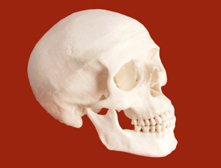Fossil skulls plug gap in human origins
Anthropologists have unearthed the oldest fossils of modern people ever found.
Share this:
- Share via email (Opens in new window) Email
- Click to share on Facebook (Opens in new window) Facebook
- Click to share on X (Opens in new window) X
- Click to share on Pinterest (Opens in new window) Pinterest
- Click to share on Reddit (Opens in new window) Reddit
- Share to Google Classroom (Opens in new window) Google Classroom
- Click to print (Opens in new window) Print
By Emily Sohn
You may know where your parents, grandparents, and great-grandparents came from. But what about their grandparents—and their grandparents’ grandparents? Anthropologists like to look even farther back, to the very beginnings of our species.
A new discovery gives some clues about where and when the human family tree began. Three human skulls unearthed in Africa are between 154,000 and 160,000 years old. That makes them the oldest fossils of modern people ever found, says lead researcher Tim White of the University of California, Berkeley.
 |
|
A fossil skull can give anthropologists clues about human origins.
|
White’s group found the skulls in Ethiopia in a village called Herto. Two of the skulls were adults. The third was a 6- or 7-year-old child. The researchers also found pieces of skulls and teeth from seven other people, along with hippopotamus bones marked by stone tools.
The new find supports a popular theory that the first humans came from Africa, the researchers say, then spread out and took over the rest of the world. Other anthropologists still think there was some mixing between ancient humans, Neandertals, and other human-like groups.
Either way, the new finds are an important link in our species’ family tree. More answers will come with more fossil discoveries. Skulls often have a lot more to say in anthropology than they do in horror movies.—E. Sohn
Going Deeper:
Bower, Bruce. 2003. African Legacy: Fossils plug gap in human origins. Science News 163(June 14):371. Available at http://www.sciencenews.org/20030614/fob1.asp .







